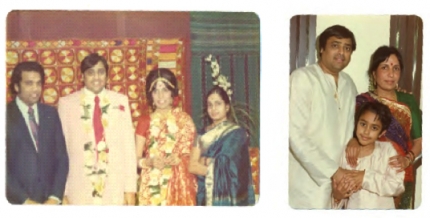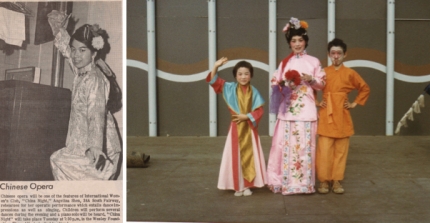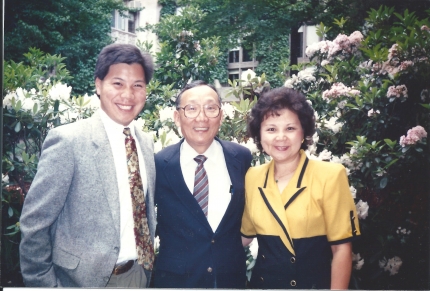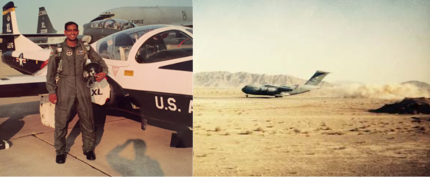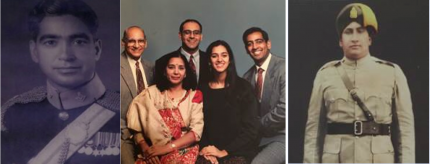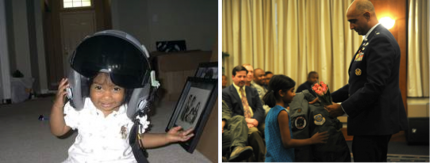Initiative on Asian Americans and Pacific Islanders Blog
#MyAAPIStory: Anand K. Parekh
Posted by on June 30, 2015 at 5:12 PM ESTIn the spirit of Immigrant Heritage Month, the White House Initiative on Asian Americans and Pacific Islanders (AAPIs) celebrates the diverse dimensions of our nation’s communities and the strength we draw from our varied immigrant identities. From cultural traditions to philosophies, many of us are shaped by our own or our family’s immigrant experiences coming to this country and transitioning into the “American life.”
In this blog series, we will explore the immigration stories of different AAPI federal leaders and how these experiences have shaped their commitment to public service.
We invite you join the conversation by sharing these stories with your communities and on social media and also sharing your own stories and thoughts by using #MyAAPIStory.
Part 5: Anand K. Parekh, Deputy Assistant Secretary for Health at the U.S. Department of Health and Human Services
Learn more about#LoveWins: A Historic Moment for LGBT Rights
Posted by on June 30, 2015 at 5:01 PM ESTAs the son of immigrants from the Philippines, an oftentimes traditional and predominantly Catholic nation, it wasn’t always easy being fully open and honest about my sexuality. And so, coming out to my parents the summer after graduating high school was one of the most liberating experiences of my life. I remember finally feeling free to be myself, especially during a pivotal growing point in my life as I entered my freshman year in college. At the University of California, Los Angeles (UCLA), I was first recruited by fellow LGBT students to a Filipino American advocacy organization, Samahang Pilipino, where we were able to gather in safe spaces to discuss intersections of identity: what it meant to be openly gay, second generation, and people of color. In addition to collectively growing in our identity, we also advocated for issues of importance to the community, fighting for representation, equal opportunity, and of course, marriage equality.
For all of those efforts, I recall Tuesday, November 4, 2008, as a bittersweet day: we saw the historic election of the first African-American President of the United States, yet California had passed Proposition 8, a ballot initiative defining marriage as an institution between a man and a woman. I was shocked at how California, a seemingly progressive state, could deny my right as an American to one day marry the person I love. It was a devastating moment in time, but as a community, we knew that we had to continue marching forward.
Learn more about#MyAAPIStory: Albert K. Shen
Posted by on June 30, 2015 at 10:16 AM ESTIn the spirit of Immigrant Heritage Month, the White House Initiative on Asian Americans and Pacific Islanders (AAPIs) celebrates the diverse dimensions of our nation’s communities and the strength we draw from our varied immigrant identities. From cultural traditions to philosophies, many of us are shaped by our own or our family’s immigrant experiences coming to this country and transitioning into the “American life.”
In this blog series, we will explore the immigration stories of different AAPI federal leaders and how these experiences have shaped their commitment to public service.
We invite you join the conversation by sharing these stories with your communities and on social media and also sharing your own stories and thoughts by using #MyAAPIStory.
Part 4: Albert K. Shen, National Deputy Director of the Minority Business Development Agency
Learn more aboutImmigrant Heritage Month: Giving Back
Posted by on June 30, 2015 at 9:04 AM ESTEd. note: This is cross-posted on the U.S. Department of Labor's blog. See the original post here.
As Americans, we all have a story. We come from every corner of the globe – different cultures, different ethnicities and different religions woven together to form the fabric of this great nation and a shared heritage that is unique to any other. In honor of Immigrant Heritage Month, Department of Labor employees are sharing some of their own stories – read them here.
Almost 60 years ago, a young Chinese man arrived by ship in Washington State, and boarded a Greyhound bus headed for a small Methodist college in Tennessee. Still in his teens, the young man knew little English. When the bus stopped at stations along the way, the only food he knew how to order in English was a hamburger and milk. So that’s what he ate for three meals a day during the weeklong journey.
Learn more about100 Years of Action: Celebrating Grace Lee Boggs
Posted by on June 30, 2015 at 8:56 AM ESTA 100th birthday in itself is a remarkable achievement, but to have used the vast majority of those years serving and advocating for the rights of others is a legacy to be remembered and honored. Today, we celebrate the achievements in the extraordinary life of iconic civil rights activist, Grace Lee Boggs, who turned 100 this week.
The child of Chinese immigrants, Grace Lee Boggs was born in Rhode Island, spending most of her childhood in Queens, New York. She says that the varying levels of discrimination she experienced both as a woman and as the daughter of Chinese immigrants allowed her to see that “the world needed changing.” Despite the barriers that a woman of color faced, especially in the 1930’s, Grace Lee Boggs has done everything in her power to do just that, change the world.
The Smithsonian Asian Pacific American Center is tweeting 100 quotes for Grace's 100 Years! @SmithsonianAPA pic.twitter.com/td52MnBKFd
— Grace Lee Boggs (@GraceLeeBoggs) June 22, 2015
Learn more about#MyAAPIStory: Ravi Chaudhary
Posted by on June 19, 2015 at 1:26 PM ESTIn the spirit of Immigrant Heritage Month, the White House Initiative on Asian Americans and Pacific Islanders (AAPIs) celebrates the diverse dimensions of our nation’s communities and the strength we draw from our varied immigrant identities. From cultural traditions to philosophies, many of us are shaped by our own or our family’s immigrant experiences coming to this country and transitioning into the “American life.”
In this blog series, we will explore the immigration stories of different AAPI federal leaders and how these experiences have shaped their commitment to public service.
We invite you join the conversation by sharing these stories with your communities and on social media and also sharing your own stories and thoughts by using #MyAAPIStory.
Part 3: Ravi Chaudhary, Member of the President’s Advisory Commission on Asian Americans and Pacific Islanders
I chose to become a pilot in the United States Air Force for one main reason – I am the son of immigrants. Growing up in the suburbs of Minneapolis, Minnesota, people regularly commented on how courageous it was to pursue a career considered so “non-traditional” in the Asian American community. Yet, in many ways my choice pales in comparison to the courage of my parents who emigrated to the U.S. from India. They chose to give up everything they knew, loved and was familiar to them, in order to pursue the American dream. Of course, they raised children with the same natural instinct to take the road less traveled. As immigrants, my parents appreciated new ways of thinking, and encouraged us to step outside the box and pursue the unknown.
Public service, including military service, has played a formative role in my family, both in India and as a newly arrived immigrant family in America. My late grandfathers, Major Pratap Singh and Deputy Inspector Pheroo Singh fought in World War II for the Indian Army and served in the Indian Police Force, respectively. Additionally, my father served in the U.S. Department of Agriculture for 35 years, and my brother State Senator Satveer Chaudhary served as the first Asian American legislator in Minnesota history. My mother is Chief Operating Officer of an organization that advocates for underrepresented AAPI communities in Minnesota, and my sister is a distinguished professor of biology at Loyola University. Following their example, I had always dreamed of serving as a pilot and aerospace engineer and my parents were very supportive when I told them I wanted to pursue an appointment to the United States Air Force Academy.
As a pilot, the very act of flight is non-traditional and the ultimate expression of human freedom. Flying conveys an intrinsic desire to liberate oneself from the forces of gravity, and the orthodoxies we sometimes get complacent with in our daily lives. Flying serves as a constant reminder that the forces of orthodoxy are always acting upon us and it is our sense of freedom that encourages us to push back in pursuit of new horizons. This was the gift given to me by my parents when they chose to immigrate to America, and further cultivated by the Air Force. We must always remember that this inherent thirst to reach beyond the sky is made possible in part by the courageous attributes of the waves of immigrants that came before us. This fact, as Vice President Biden often remarks, is how America is constantly able to re-invent itself, and remain on the leading edge of innovation.
It is also a bit of a metaphor for the challenges young AAPIs face while growing up. Thriving in two worlds, you’re never Asian enough, and never American enough! With thousands of AAPIs now answering the call to serve our nation, I see the term “non-traditional” becoming less and less useful to our next greatest generation. Yet the act of pursuing what we consider “non-traditional” is essential to our growth as an immigrant community. I believe we’ve now shattered the term “non-traditional,” and more.
Our next generation of youth “dream in extreme” every day, and have a vision for careers and opportunities that I cannot even imagine. We must empower them to chart their own path with courage, as our parents did for us. That is the legacy of our vibrant immigrant community that we leave behind, and the reason I fell in love with America. And as we pass on our wings to our children, I am filled with great hope and optimism for the future of our nation, a nation built upon generations of immigrants.
Ravi Chaudhary was appointed to the President’s Advisory Commission on Asian Americans and Pacific Islanders by President Obama in 2014. He is also currently the Executive Director for Regions and Center Operations with the Federal Aviation Administration (FAA). Prior to joining the FAA, Ravi was an Air Force officer, serving as an Executive Officer to the Commander, Air Force District of Washington, Joint Base Andrews, Maryland. He has logged over 3,000 flight hours as a pilot and flight test engineer, including over 760 combat hours. Ravi’s awards include the NASA Stellar Award, Meritorious Service Medal, Air Medal, and Iraq and Afghanistan Campaign Medals. Ravi received a B.S. from the United States Air Force Academy, an M.S. from Saint Mary’s University, and an M.A. in Military Operational Art and Science from the Air Force’s Air University.
Learn more about
- &lsaquo previous
- 1
- 2
- 3
- 4
- 5
- 6
- 7
- 8
- 9
- …
- next &rsaquo
White House Blogs
- The White House Blog
- Middle Class Task Force
- Council of Economic Advisers
- Council on Environmental Quality
- Council on Women and Girls
- Office of Intergovernmental Affairs
- Office of Management and Budget
- Office of Public Engagement
- Office of Science & Tech Policy
- Office of Urban Affairs
- Open Government
- Faith and Neighborhood Partnerships
- Social Innovation and Civic Participation
- US Trade Representative
- Office National Drug Control Policy
categories
- AIDS Policy
- Alaska
- Blueprint for an America Built to Last
- Budget
- Civil Rights
- Defense
- Disabilities
- Economy
- Education
- Energy and Environment
- Equal Pay
- Ethics
- Faith Based
- Fiscal Responsibility
- Foreign Policy
- Grab Bag
- Health Care
- Homeland Security
- Immigration
- Innovation Fellows
- Inside the White House
- Middle Class Security
- Open Government
- Poverty
- Rural
- Seniors and Social Security
- Service
- Social Innovation
- State of the Union
- Taxes
- Technology
- Urban Policy
- Veterans
- Violence Prevention
- White House Internships
- Women
- Working Families
- Additional Issues
